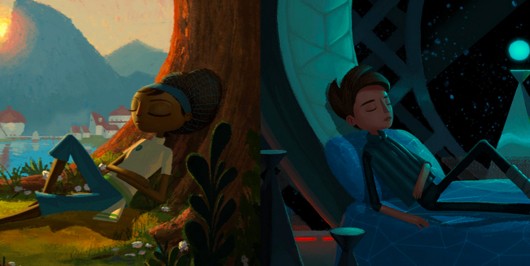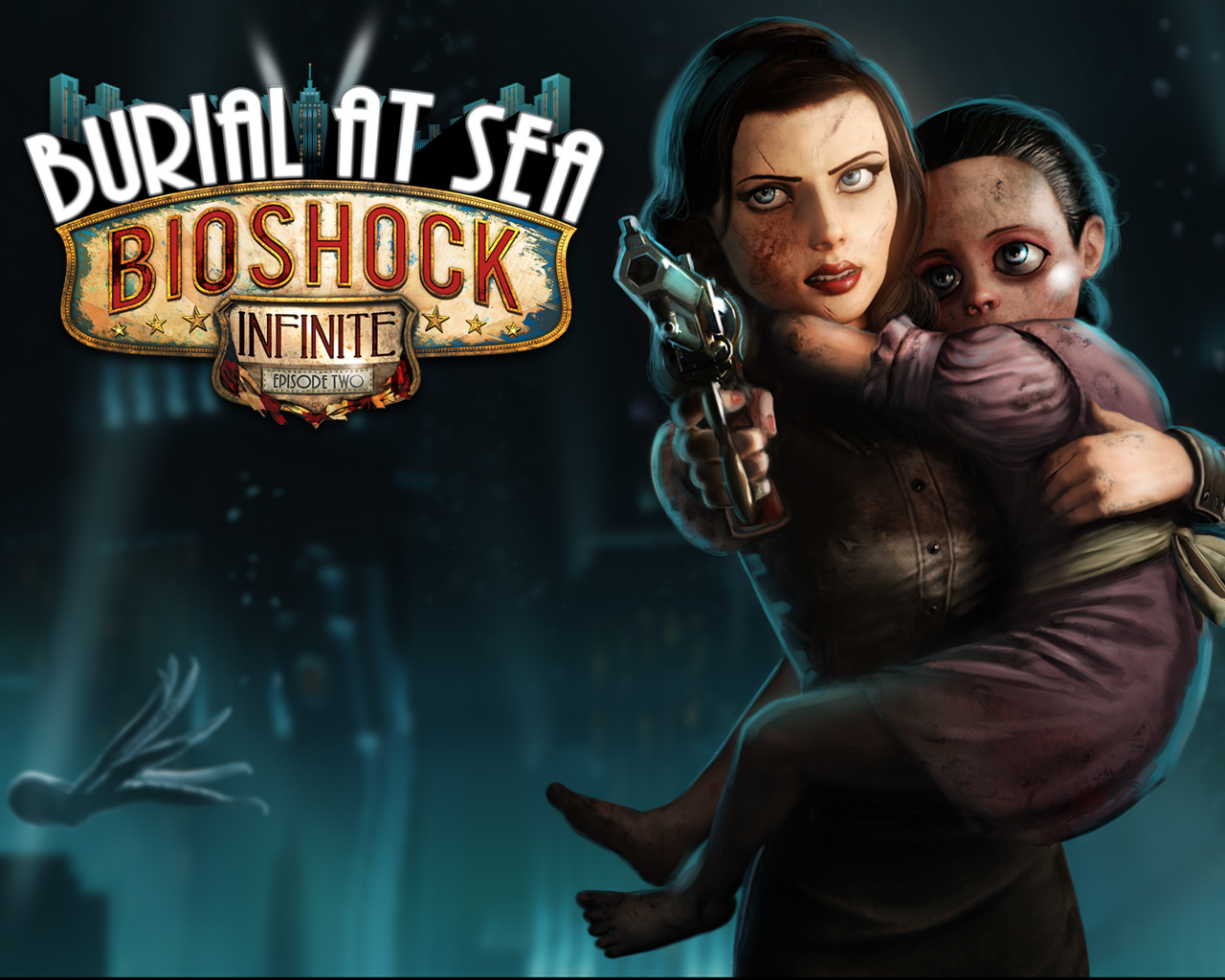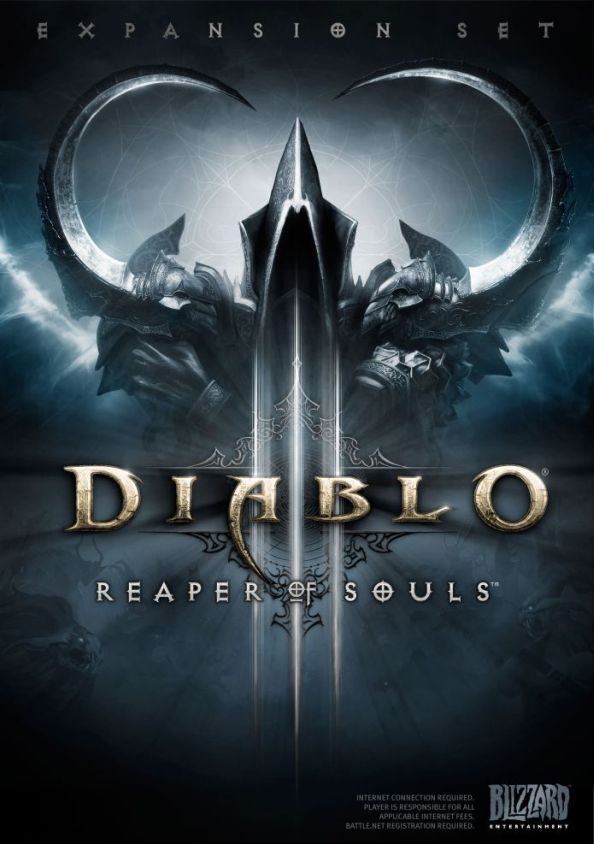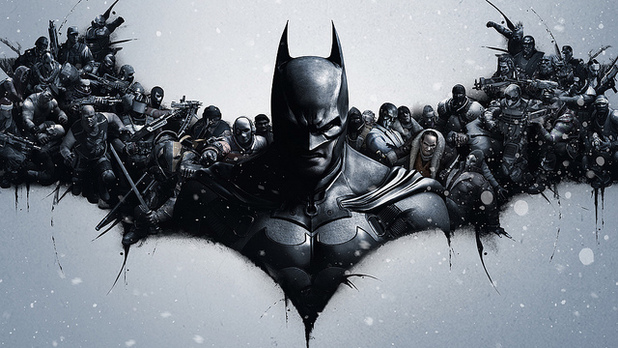 |
| This is the opening screen of Broken Age, where you choose which side of the story you want to experience first. On the left is Vella and on the right is Shay. |
Over the past few years, adventure style games have become much more mainstream, especially due to the mainstream success of Telltale's The Walking Dead. By the way, if you haven't played that game and have any kind of console or decent PC, it's definitely worth playing if you have any interest in the series.
For those of you who don't know, Tim Schafer is responsible for Monkey Island, widely considered to be one of the classics of the genre. Schaefer's company, Double Fine, launched a Kickstarter to create a new adventure game with modern graphics but an old adventure style feel.
So we have a genre that is resurgent, a developer that is respected by the industry and fans, and now Kickstarter, which has changed the economics of creating games that may not be as mainstream as the type of stuff that sells in a Wal Mart/Best Buy retail environment. Not to mention the fact that smaller budget titles have become a staple in both the PC and console gaming over the past few years.
Without all of these things, a beautiful and artistic game like Broken Age would never have seen the light of day. It really is a confluence of a number of different things. I wonder if a game like this could have come out at any other time.
So now that I've talked about the circumstances surrounding the game, I'll talk about the basics of the game itself. This is a game only on PC (for now) that tells the story of two characters. Vella and Shay. Shay appears to be in a ship that does nothing but coddle him as if he was a baby, and he desperately wants to have meaning to his life aside from the boring monotony he faces every day. Vella is a girl who lives in a village and has been chosen to participate in the Maiden's Festival. Everybody has a lot of pride in the Maidens, because when they are devoured by a giant monster named Mog Chothra, the village is saved because of that sacrifice.
Both characters struggle with their place in their respective worlds. It's very easy for the player to empathize with them. We have all felt at times that the expectations of society didn't actually make sense and yearned to break the mold for one reason or another. I immediately connected with both characters and found them to be instantly likeable. This is very important for an adventure game that is focused entirely on the characters' journeys.
The actual gameplay is simple. Click on items to interact with them, drag items in your inventory to other items to try and use them together. For example, use a screwdriver on a vent in order to open it and proceed. Old school adventure games could be somewhat cryptic about this process. You had a ton of items and things to interact with and sometimes the relationship between these items wasn't all that obvious. I think at the time of Monkey Island, this helped add depth and value, but in a modern game this would seem annoying and monotonous.
Fortunately, Broken Age does an excellent job by not making it quite as simple as The Walking Dead, but simple enough that I didn't need the use of any hints from the Internet to find out what to do next. There were only a few times where I needed to do some trial and error. The puzzles required some thinking, but nothing too difficult. At no time did I feel frustrated with the experience. It felt modern. This may turn off some people looking for that old school experience, but I suppose you can't please everybody.
As I alluded to before, the presentation of this game is incredible. The art is very beautiful, the music has a distinct tone that changes as the story progresses. Several characters in the game have well known voice actors like Elijah Wood (Shay) and Jack Black (I don't think I want to tell you who he is). It even has Hwil Hwheaton...er, Wil Wheaton.
The bottom line is that if you are at all interested in games like Monkey Island, Maniac Mansion, The Walking Dead, etc., you owe it to yourself to give this game a shot. Right now, they only have Act 1 out, and Act 2 is going to come hopefully in the near future. When I sat down the play the game, I thought I would play through just one character and stop, but I was so interested in the game that I went right into the second character despite the fact that I probably shouldn't spend so much time playing a single thing non-stop. That's a credit to the story that does a great job drawing you in from the very beginning.
So buy it with confidence (or if you are like me, Steam Share it from someone else's library with confidence).
The other thing I wanted to write about in this post is the concept of Kickstarter and my ambivalence about it as a means for funding projects that fans want.
For those of you who don't know about crowdfunding, the idea is to decentralize financing for projects such as a game like Broken Age, or a movie, or a book...anything really that has enough interest from a fan base. Kickstarter is a big name in crowdfunding, and most projects have incentives based on the amount of money fans give to the cause. A small donation might entitle them to the completed product, and a big donation may entitle them to something special, like an autograph or a chance to meet the creator. If you check out their website I'm sure you will get the concept quickly.
On first glance, this is a great thing. I think most people agree that corporatizing of art can often lead to a worst product because of the desire of the company funding it. A movie, for example, might have lots of product placements in it. Or a character in a game might have to change because of some kind of political or social concern. While some of these compromises aren't a big deal and may even improve the end product, it's easy to imagine that the vision of the creator can start to get lost with this kind of "interference".
Kickstarter removes that. These projects have to be held accountable to their fans. And this is both a good and bad thing. It's good because creative people generally want to please their fans and fans want the creative people to put out the product they want. But the problem lies with ultimate accountability, and this is what worries me about the future of Kickstarter as it pertains to games.
Broken Age is a brilliant piece of work. Nobody can honestly say that Double Fine screwed their customers with this product. Perhaps it's not perfect for some and maybe even some of the backers of the Kickstarter are disappointed, but they weren't ripped off. They got a complete (at least Act 1) and polished game. If it's not your cup of tea...well...you can't please everyone.
My worry is that eventually someone will take advantage of this system. A group could raise millions of dollars via Kickstarter on an idea that seems appealing to the fans, but is ultimately not executed on in the right way. Or maybe a game comes out and just has a million bugs that are never fixed. I don't see how Kickstarter can guarantee the quality of these projects or that these projects ever reach the light of day. At least with a preorder, the commitment from the fan is minimal.
So let's say a high profile Kickstarter project fails...will the community keep faith with the system? Double Fine came through on this one, but if another company did it, would Double Fine's next crowdfunded project get the money it needs? Would the taint of one failed Kickstarter hurt the entire crowdsourcing community?
A bank, investors, or a publisher can hold these developers directly accountable for their work and force deadlines and bring in additional resources if necessary. But what can fans do? Complain on a forum where nothing will really happen to address their concerns. Also, there's nobody really making sure that the money that's raised to create is being used in a proper way.
There's one more problem, which is more of an ethical concern. Double Fine obviously has limited resources and needs to be careful before investing their money in big projects, but there's plenty of reason to believe that groups who DO have the money to make these projects on their own could use Kickstarter not to create something out of nothing, but to mitigate their own risk of developing a failed project. It really shouldn't be the fans that take the financial risk that a project fails, but the developing group. Zach Braff tried to raise money for a movie, but why should anybody pay him? He's a multimillionaire with connections to Hollywood elites. He has plenty of other avenues to raise money besides his fans. "Passion projects" are expensive...that's why they call them a passion. If you are so passionate about making something, then you should be willing to take the risk to invest in it. If I started a business on my own and I had no skin in the game, then a bank or another investor wouldn't want to help me raise money either.
So I didn't back this game, and to be honest I'm a little reluctant to back anything on Kickstarter. As I see it, if I'm investing in something, I should get a return. The only return you get on Kickstarter is a product, but if Broken Age becomes a huge commercial success, they will not be sharing in that financial success with the backers. Frankly, if Double Fine is as successful with this game in the end as I think they might be, I think they owe it to their fans to go the extra mile and perhaps give extra content not previously promised or something else to make them feel even more appreciated. The fans who backed this game deserve more credit than a free copy of the game because without them it wouldn't exist in the first place in the most literal sense. They should share in Double Fine's success somehow.
I don't wish to dissuade anyone from using Kickstarter. I think it's a brilliant concept and for the right people I think this is a way to utilize crowdfunding and allow small shops to compete with the big boys. But over time I suspect some changes will have to be made. It seems inevitable to me that Kickstarter will run into a major problem that will leave people questioning the service and the entire crowdsourcing paradigm.
This post turned out longer than I expected it to be, but as I was writing I found myself coming up with more and more questions.












